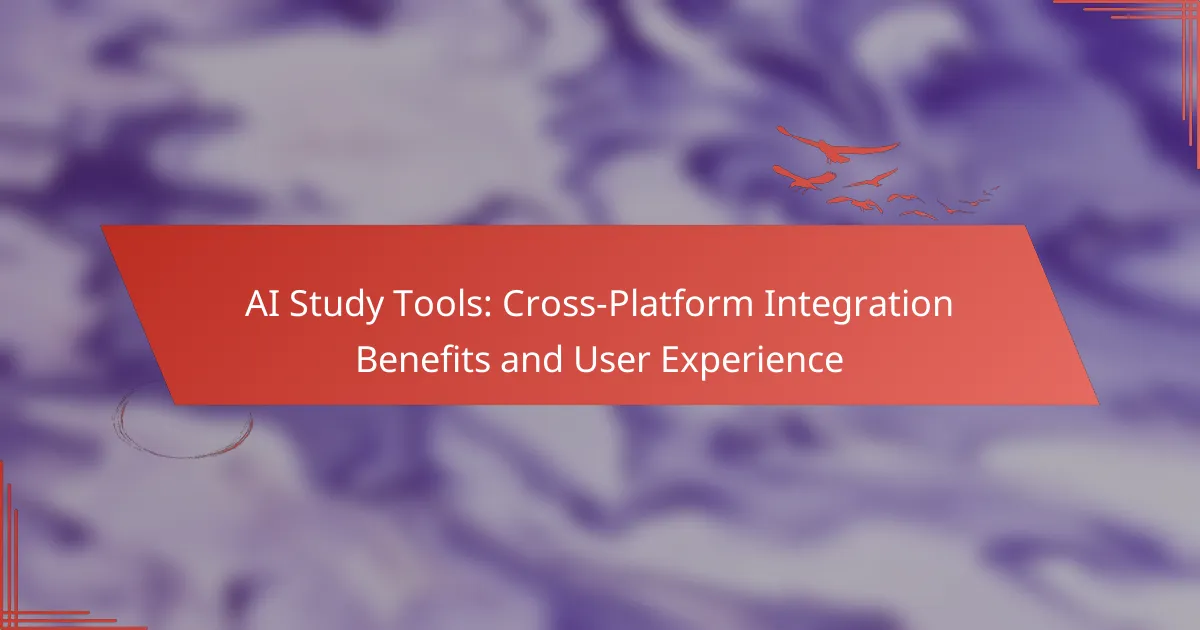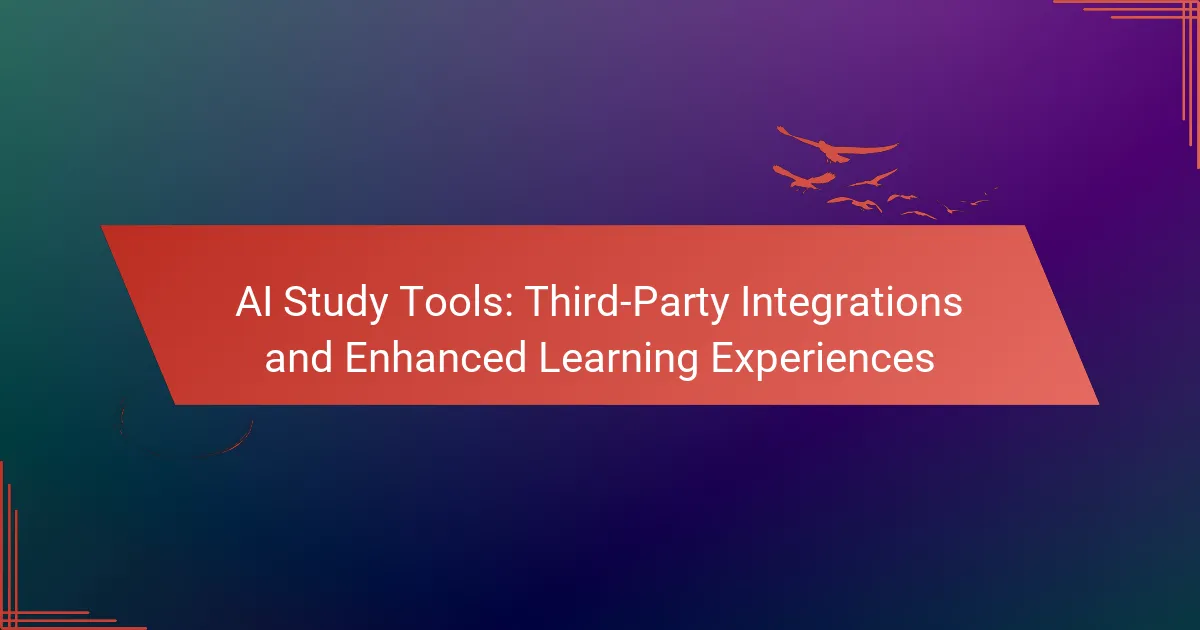AI study tools significantly enhance the learning experience by offering personalized pathways, efficient progress tracking, and improved collaboration. Their ability to integrate seamlessly across multiple platforms ensures that users can access study materials and monitor their progress from any device, making learning more flexible and organized.

What Are the Key Benefits of AI Study Tools?
AI study tools offer significant advantages for learners by enhancing efficiency, personalizing experiences, and improving collaboration. These tools leverage artificial intelligence to provide tailored learning paths, track progress, and facilitate seamless integration across various platforms.
Enhanced learning efficiency
AI study tools streamline the learning process by automating repetitive tasks and providing instant feedback. This allows students to focus on understanding concepts rather than getting bogged down by administrative details. For instance, tools that generate quizzes based on study material can save time and reinforce knowledge retention.
Additionally, these tools can analyze user performance and suggest optimal study schedules, maximizing productivity. By identifying strengths and weaknesses, AI can help learners allocate their time more effectively, often leading to improved outcomes in a shorter timeframe.
Personalized study experiences
One of the standout features of AI study tools is their ability to create personalized learning experiences. By assessing a learner’s unique needs, preferences, and pace, these tools can adapt content accordingly. For example, if a student struggles with a particular topic, the AI can provide additional resources or alternative explanations tailored to their learning style.
This customization not only enhances engagement but also fosters a deeper understanding of the material. As learners progress, the AI continues to adjust the difficulty level, ensuring that challenges remain appropriate and motivating.
Improved collaboration across platforms
AI study tools facilitate collaboration by integrating seamlessly with various platforms, such as learning management systems and productivity apps. This interoperability allows users to access resources and share information effortlessly, regardless of the tools they prefer. For example, a student can work on a project in a word processor while simultaneously accessing AI-generated insights from a study app.
Moreover, these tools often include features that enable real-time collaboration, such as shared notes or group quizzes, enhancing teamwork and communication among peers. This interconnectedness can lead to a more cohesive learning experience, especially in remote or hybrid learning environments.
Data-driven insights for progress tracking
AI study tools provide valuable data-driven insights that help learners track their progress over time. By analyzing performance metrics, these tools can highlight areas of improvement and suggest targeted strategies for development. For instance, a dashboard might display trends in quiz scores, time spent on different subjects, and completion rates for assignments.
These insights empower students to take control of their learning journey, making informed decisions about where to focus their efforts. Regularly reviewing this data can also motivate learners by showcasing their growth and achievements.
Accessibility across devices
AI study tools are designed to be accessible across various devices, including smartphones, tablets, and computers. This flexibility allows learners to study anytime and anywhere, accommodating different lifestyles and schedules. For example, a student can review flashcards on their phone during a commute and switch to a laptop for more in-depth research later.
Furthermore, many tools offer cloud-based storage, ensuring that progress is saved and synchronized across devices. This means that learners can pick up right where they left off, enhancing the overall study experience and reducing frustration associated with device limitations.

How Do AI Study Tools Integrate Across Platforms?
AI study tools integrate across platforms by utilizing various technologies that allow for efficient data sharing and synchronization. These integrations enhance user experience by ensuring that study materials and progress are accessible from multiple devices and applications.
API connections for seamless data sharing
API connections enable AI study tools to communicate with other software applications, allowing for seamless data sharing. This means that users can access their study materials, notes, and progress across different platforms without manual input.
For instance, a user can start studying on a mobile app and continue on a desktop application without losing any data. This integration often requires developers to adhere to specific API standards to ensure compatibility and security.
Cross-device synchronization features
Cross-device synchronization ensures that any changes made on one device are instantly reflected on all other devices. This feature is crucial for students who switch between devices, such as a tablet, smartphone, and laptop.
Many AI study tools offer real-time synchronization, which means updates occur within seconds. Users should look for tools that support offline access, allowing them to study without an internet connection while still syncing later.
Integration with popular learning management systems
Integration with popular learning management systems (LMS) allows AI study tools to pull in course materials and assignments directly. This feature simplifies the study process by centralizing resources in one location.
Common LMS platforms like Moodle, Canvas, and Blackboard often have built-in support for AI study tools, making it easier for educators and students to utilize these technologies effectively. Users should verify compatibility before choosing an AI study tool to ensure a smooth integration experience.

What Are the Best AI Study Tools for Cross-Platform Use?
The best AI study tools for cross-platform use enhance learning by providing seamless access across various devices. These tools facilitate organization, interactive learning, note-taking, and comprehensive study management, making them ideal for students and professionals alike.
Notion for organization and collaboration
Notion is a versatile tool that combines note-taking, task management, and database features, making it ideal for organization and collaboration. Users can create customized workspaces that integrate notes, to-do lists, and project timelines, all accessible from any device.
To maximize its effectiveness, utilize templates for different subjects or projects, and invite collaborators to share insights in real-time. Be mindful of Notion’s learning curve; investing time in mastering its features can significantly enhance your productivity.
Quizlet for interactive learning
Quizlet offers a platform for interactive learning through flashcards, quizzes, and games, making study sessions more engaging. It supports various study modes, including matching games and practice tests, which cater to different learning styles.
To get the most out of Quizlet, create your own sets tailored to specific subjects or use existing ones shared by other users. Regularly revisiting these materials can reinforce knowledge retention, but avoid over-reliance on memorization without understanding the underlying concepts.
Evernote for note-taking and organization
Evernote excels in note-taking and organization, allowing users to capture ideas, images, and web clippings in one place. Its powerful search functionality makes it easy to retrieve information quickly, even from handwritten notes.
For effective use, categorize notes with tags and notebooks, and regularly review and update them. Be cautious of the free plan’s limitations; consider upgrading if you need more storage or advanced features for extensive study materials.
Microsoft OneNote for comprehensive study management
Microsoft OneNote provides a comprehensive study management solution by offering a digital notebook experience. Users can organize notes into sections and pages, integrate multimedia, and collaborate with others, all while syncing across devices.
To optimize your OneNote experience, use its drawing tools for visual notes and audio recording features for lectures. Ensure you regularly back up your notebooks to avoid data loss, and explore its integration with other Microsoft Office tools for enhanced functionality.

What Criteria Should You Consider When Choosing AI Study Tools?
When selecting AI study tools, consider user interface, integration capabilities, and subscription pricing models. These factors significantly impact usability, compatibility with your current systems, and overall cost-effectiveness.
User interface and experience
The user interface (UI) and overall experience are crucial for effective learning. A clean, intuitive design helps users navigate the tool easily, reducing frustration and enhancing productivity. Look for features like customizable dashboards and easy access to resources.
Consider tools that offer a mobile-friendly version or app, as this allows for studying on-the-go. User reviews can provide insights into the actual experience, highlighting any common issues or particularly praised features.
Integration capabilities with existing tools
Integration capabilities determine how well the AI study tool works with your existing software. Look for tools that seamlessly connect with popular platforms like Google Drive, Microsoft Office, or learning management systems. This ensures that you can easily import and export materials without losing data.
Check for APIs or third-party integrations that can enhance functionality. Tools that support collaboration features, such as sharing notes or group study sessions, can significantly improve the learning experience.
Subscription pricing models
Subscription pricing models vary widely among AI study tools, so it’s essential to understand what you are paying for. Some tools offer free basic versions with limited features, while others may charge monthly or annual fees ranging from low tens to hundreds of dollars, depending on the level of service.
Evaluate whether the pricing aligns with your budget and learning needs. Look for trial periods or money-back guarantees to test the tool before committing. Be cautious of hidden fees or costs for additional features that may not be immediately apparent.

How Do Users Experience AI Study Tools?
Users experience AI study tools as interactive platforms that enhance learning efficiency and engagement. These tools often integrate across multiple devices, allowing seamless access to study materials and personalized feedback.
Ease of Access Across Devices
AI study tools provide users with the ability to access their study materials from various devices, such as smartphones, tablets, and laptops. This cross-platform integration ensures that learners can continue their studies anytime and anywhere, which is particularly beneficial for busy students.
For example, a student can start a lesson on a laptop and finish it on a smartphone while commuting. This flexibility helps maintain continuity in learning and reduces the chances of losing valuable study time.
Personalized Learning Experience
AI study tools often use algorithms to tailor content to individual learning styles and paces. By analyzing user interactions, these tools can suggest resources, quizzes, and study schedules that align with each learner’s needs.
This personalization can lead to improved retention rates and better overall performance. For instance, if a user struggles with a specific topic, the tool may recommend additional practice materials or interactive exercises to reinforce understanding.
Real-Time Feedback and Assessment
Many AI study tools offer real-time feedback on quizzes and assignments, allowing users to identify areas for improvement immediately. This instant assessment helps learners adjust their study strategies effectively.
For example, a student might receive immediate insights into their quiz performance, highlighting strengths and weaknesses. This feedback loop encourages active engagement and motivates users to focus on challenging subjects.
Collaboration Features
Collaboration is a key aspect of many AI study tools, enabling users to connect with peers for group study sessions or discussions. Features like shared notes, group quizzes, and discussion boards foster a sense of community and enhance the learning experience.
Students can benefit from diverse perspectives and collective knowledge, which can deepen their understanding of complex topics. Tools that facilitate collaboration often lead to improved outcomes and a more enjoyable study process.



